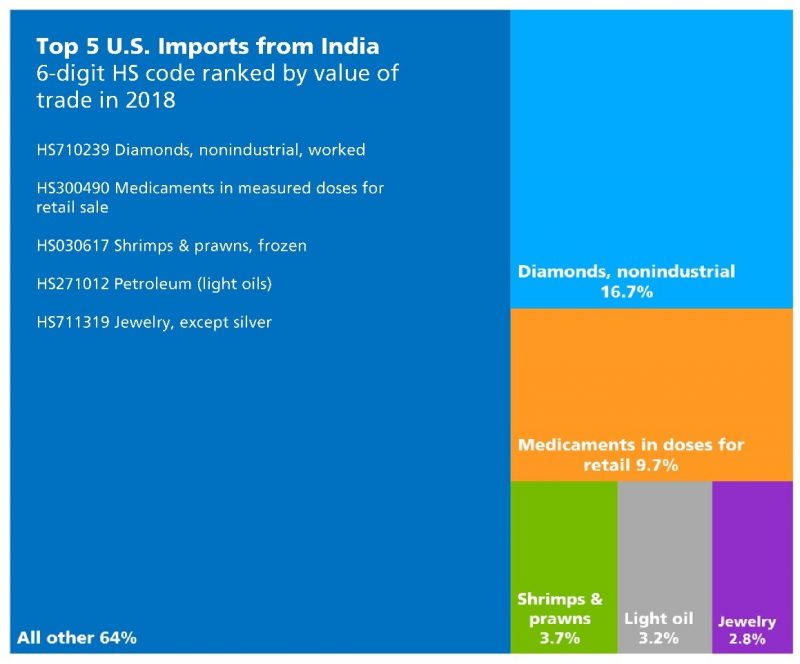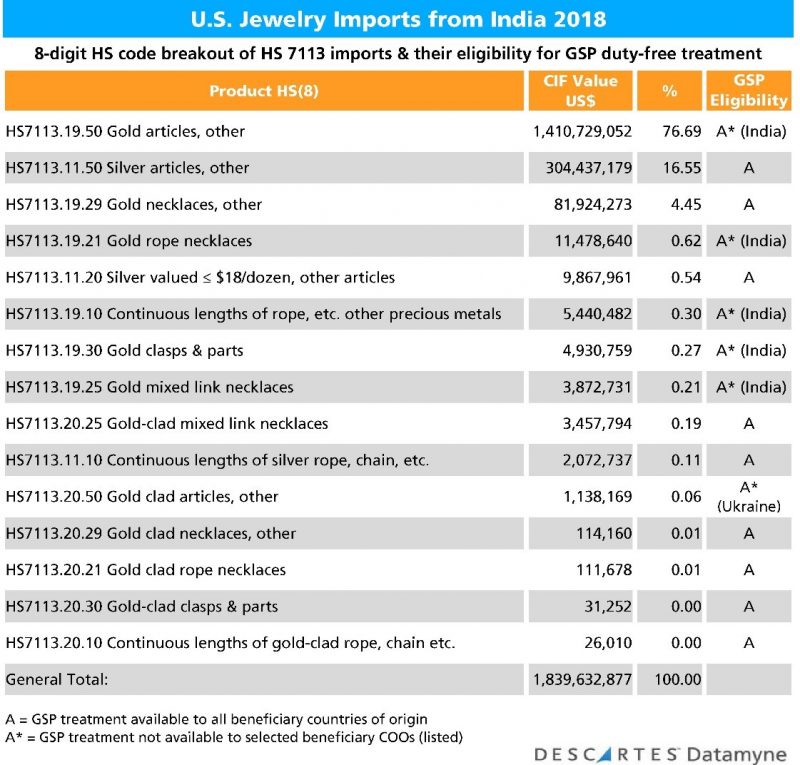The Office of the United States Trade Representative announced an end to Generalized System of Preferences (GSP) eligibility for India and Turkey after finding the countries no longer meet the conditions for getting duty-free access to U.S. markets as developing economies.
The U.S. will end its designation of India and Turkey as beneficiary developing countries under its Generalized System of Preferences (GSP) program. The March 4 announcement by the U.S. Trade Representative (USTR) sets the effective at least 60 days out – after the official notifications to Congress and the governments of India and Turkey. The status change will be enacted by a Presidential Proclamation.
GSP programs aim to boost developing economies by waiving import duties on their products. The U.S. program was first authorized under the Trade Act of 1974 and last renewed through April 2020 by President Trump a year ago.
Congress sets conditions on the trade preferences. The duty-free imports are capped by “competitive need limitations” (CNLs) on the value and volume of any one import from any one source. The GSP beneficiaries also agree to open their markets to U.S. exports and abide by internationally agreed standards for protecting workers’ rights and intellectual property. The President is authorized to review and determine the continued eligibility of beneficiaries and products for benefits and can override CNLs in response to petitions.
Approximately 5,000 Harmonized Tariff System (HS) coded products are listed as eligible for GSP treatment, with 3,500 available to almost all beneficiary countries and 1,500 reserved for “least developed” beneficiaries.
There are currently 103 independent countries and 17 non-independent countries and territories listed as eligible beneficiaries of GSP. Taken together, these trade partners accounted for 9.1% of U.S. imports by value and 9.92% of exports in 2018, based on Descartes Datamyne trade data (and illustrated in the next charts).


India and Turkey, the two countries to be removed from the list of GSP-eligible countries, are leading U.S. trade partners within this select group: India accounted for nearly a quarter of U.S. imports from GSP-eligible countries of origin last year. Turkey, ranked seventh among GSP COOs (and so not appearing in the following chart on imports), claimed a 4.5% of imports from trade-preference countries.
India and Turkey are also among the top GSP-eligible market destinations for U.S. exports, as these charts show:


GSP Eligibility for India and Turkey: Gauging the Impact
It is important to note that all U.S. imports from GSP-eligible countries are not coming in duty-free. For one thing, not all products sourced from these countries are GSP-eligible. Further, these countries are excluded from the preferential treatment of some otherwise GSP-eligible products.
Take, for example, the top five U.S. imports by value supplied by India:

The top three Indian import product categories – diamonds, medicaments, and shrimp – are not eligible for GSP preferential treatment from any COO. In the category of light oils, motor fuel oil is GSP-eligible, but only from the least developed economies.
There are 8-digit HS coded products in the category of jewelry, made from or clad in precious metals, that are GSP-eligible. However, many of these are not eligible for duty-free entry when sourced from India – starting with HS71131950 gold articles, other, which accounts for 77% of U.S. jewelry imports from India, as the table shows:

India has said that the loss of its beneficiary status under GSP will have limited impact on its exports to the U.S. Reuters reports that India used the duty-free concession for about 60% of the products eligible for preferential treatment, realizing an annual benefit of $190 million. Total U.S. imports from India were valued at $54 billion in 2018, according to our U.S. Census data.
Descartes Datamyne data on U.S. imports from Turkey indicates the loss of preferences will have a relatively limited impact on trade overall. Drawing on information from Descartes CustomsInfo, we surveyed the top 500 6-digit HS codes, which accounted for a little over 95% of Turkish imports valued at $10.9 billion in 2018. We identified 157 codes for products that might benefit from GSP eligibility. In 2018, these products accounted for 15% of Turkish imports.
This is not to downplay the potential disruption within select product categories. For example, polyethylene terephthalate (PET), a bellwether product tracked by this blog, is GSP-eligible (both HS390761 and HS390769). However, imports from GSP-eligible COOs Argentina, India, Indonesia and Thailand have been excluded from preferential treatment. The U.S. sourced 5.8% of its imports from Turkey in 2018. The loss of GSP eligibility may impact this trade.
Here’s a closer look at the top 15 U.S. imports from Turkey along with their GSP status:

As the table indicates, only three of the top Turkish imports are eligible for preferences.
Turkey’s trade minister has said the U.S. decision conflicts with – but will not dissuade Turkey from – the two countries’ mutual goal of reaching $75 billion in bilateral trade. Ruhsar Pekcan also noted the negative impact would be largely borne by small- and mid-sized enterprise in the U.S., as reported by Turkish news agency Anadolu Agency.
GSP Eligibility for India and Turkey: New Front in the Trade Wars?
Even as the Trump Administration confirmed that it would postpone increasing tariffs on China indefinitely, signaling a de-escalation in trade tensions, United States Trade Representative (USTR) announced the end of GSP trade preferences for India and Turkey – prompting some headline writers to suggest the U.S. was opening a new front in the trade wars.
In the case of Turkey, a GSP beneficiary since 1975, the USTR cites an increase in Gross National Income (GNI) per capita, declining poverty rates, and export diversification, by trading partner and by sector, as evidence that this country has graduated to a higher level of economic development and no longer needs preferential treatment. In testimony at the USTR hearing last fall, Aytac Yenal, Deputy Director General of Turkey’s Ministry of Trade asserted that, as it is classified as an upper middle income country, it continues to meet the U.S. GSP criterion for a developing economy.
Turkey’s trade minister has said the U.S. decision conflicts with – but will not dissuade Turkey from – the two countries’ mutual goal of reaching $75 billion in bilateral trade. Ruhsar Pekcan also noted the negative impact would be largely borne by small- and mid-sized enterprises in the U.S., as reported by Turkish news agency Anadolu Agency.
In contrast, the USTR cites India’s failure to provide the U.S. with assurances that it will provide equitable and reasonable access to its markets in numerous sectors as the reason for terminating that country’s GSP eligibility. In its notice of India’s eligibility review, USTR reported that it had accepted petitions from trade groups in the dairy and medical technology industries asserting that India had raised trade barriers against their exports.
Given that India and the U.S. have been trading tariffs since the U.S. imposed duties on certain aluminum and steel imports last year, the termination looks more like a tit-for-tat gambit in the ongoing negotiation between New Delhi and Washington to reset trade relations.
Trade content solutions:
- Descartes CustomsInfo™ Manager helps clients minimize trade barriers with a vast database of regulations, rulings, duties, and more. Learn more.
- Descartes Datamyne™ can provide a wealth of data on U.S. trade including values and volumes by specific HS code. In addition, our maritime bill of lading data captures the transactional and logistical details of U.S. import trade – including consignees, shippers, and notify parties, cargo values and volumes. Ask for a demo.



